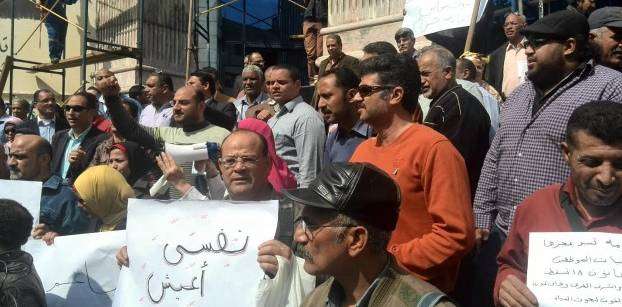Labour protests increased 25 pct since January - report

Dozens demonstrate the re-passing of the Civil Service Law on the stairs of the press syndicate on Mar. 20, 2016. ASWAT MASRIYA
CAIRO, May 1 (Aswat Masriya) - Over the past four month, the pace of workers' protests has increased by 25 per cent compared to the same period last year, according to a research group that monitors protests in Egypt.
The Demo Metre is based on a number of research studies, and it is issued as a result of a merger between two Egypt-based civil society organisations that study democracy and human rights issues.
Released on the occasion of Labour Day, the Demo Metre's report indicates that 99.2 per cent of those protests are linked to workers' rights.
A total of 493 labour protests have taken place over the period between January and April, while 1,117 labour protests have taken place over the past year alone, which marks an increase in labour protests after a calm periio, said the report.
The workers' coordinator at the Egyptian Center of Economic and Social Rights, Dalia Moussa, told Aswat Masriya that labour protests have increased significantly since the end of 2015.
She attributed the increase to the surge in prices and the dire economic conditions that Egypt is going through. She added that workers believe that the state is supporting businessmen, not them.
Demo Metre documented 98 labour protests in January, 164 in February, 134 in March, and 97 in April.
Moussa also attributed the decline in the rate of labour protests throughout 2015 to a "severe security grip" that prevented workers from protesting.
"Anyone who tried to protest was classified as a member of the Muslim Brotherhood," she said.
But tax officials and customs workers broke the barrier of fear during the last months of 2015 and demonstrated against the Civil Service Law, she added.
Though they did not get what they wanted, which was the abolition of the law at the time, they grabbed attention by expressing their opposition to the law" even after it came into effect.
The law was only applied for a short period of time, despite the protests against it. But the House of Representatives, which was elected after the law had been issued, rejected the law.
The government had issued the Civil Service Law in March 2015 in the absence of a parliament. The law aims to restructure the six million-strong government workforce and control the growing wage bill.
The general coordinator of the Center for Trade Unions and Workers Services, an independent group supporting workers' rights, said that workers' protests and strikes are expected to intensify in the current period given the deteriorating economic conditions.
Kamal Abbas added the past period has seen attempts to eliminate independent trade unions, which gave strength to labour movements and constituted one of the gains of the 2011 Uprising.
Moussa agreed that independent syndicates disintegrated over the past period, which led to the decline in the pace of labour protests.
The government does not legally recognize the new independent trade unions, which began to emerge in 2008.
The number of independent unions increased significantly following the 2011 Uprising, but the Ministry of Manpower refused to recognize any of them despite Article 76 of the current constitution, which provides for the right to form independent unions.
Abbas notes that in the past year, the Ministry of Manpower gave instructions to all the ministry's directorates to reject the registration of independent unions and syndicates, which he considered a decline in freedom of association.
Abbas believes that there is an attack on all independent trade unions
In the wake of the 2011 Uprising, emerging unions succeeded in establishing the first federation for independent labour unions in Egypt, which included dozens of unions under its umbrella. The federation, however, saw a significant split internally, which led to its disintegration.
Abbas expects labour movements to increase in the coming period, because "the government does not take into consideration the economic crisis and the hike in prices though they might result in a charged labour movement."
A wave of recurrent workers’ strikes, which began in late 2006, shaped the build-up to the 2011 Uprising.









facebook comments